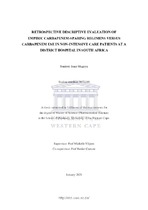| dc.contributor.advisor | Viljoen, Michelle | |
| dc.contributor.author | Mugoya, Isaac | |
| dc.date.accessioned | 2021-04-22T11:12:06Z | |
| dc.date.available | 2022-01-01T22:10:06Z | |
| dc.date.issued | 2021 | |
| dc.identifier.uri | http://hdl.handle.net/11394/8228 | |
| dc.description | Magister Pharmaceuticae - MPharm | en_US |
| dc.description.abstract | Antimicrobial resistance is a global concern associated with increased morbidity and mortality. It has been estimated that, by 2050, the continuous escalation of antimicrobial resistance, globally, will result in more deaths per year, compared to cancer and diabetes. The direct and indirect impact of ineffective antibiotics, and therefore, antimicrobial resistance, will be hardest felt by low and middle-income countries, as the financial burden will be too great to manage.
Carbapenems are considered the last line of antimicrobials to treat multidrug-resistant bacterial infections. They are the preferred choice to treat infections, presenting with extended-spectrum beta-lactamases (ESBL) producing Enterobacteriacea. Various strains of bacteria that have become resistant, due to the selective pressure, as a result of carbapenem over use, are referred to as Carbapenem-resistant Enterobacteriaceae (CRE). | en_US |
| dc.language.iso | en | en_US |
| dc.publisher | University of Western Cape | en_US |
| dc.subject | Antimicrobial resistance | en_US |
| dc.subject | Antimicrobial stewardship | en_US |
| dc.subject | Carbapenem | en_US |
| dc.subject | Carbapenem-resistant enterobacteriaceae | en_US |
| dc.subject | Carbapenem-sparing regimen | en_US |
| dc.subject | Health outcomes | en_US |
| dc.title | Retrospective descriptive evaluation of empiric carbapenem-sparing regimens versus carbapenem use in non-intensive care patients at a district hospital in South Africa | en_US |
| dc.rights.holder | University of Western Cape | en_US |

